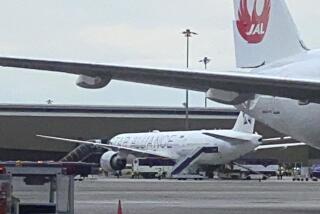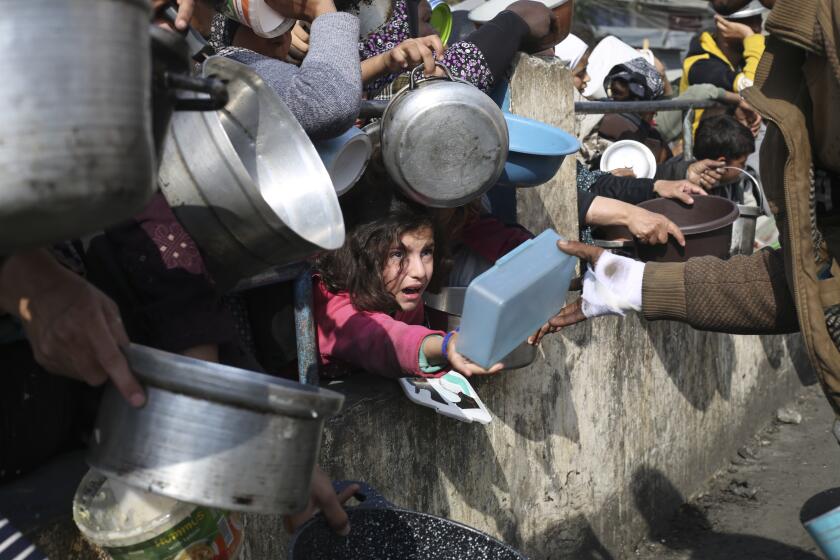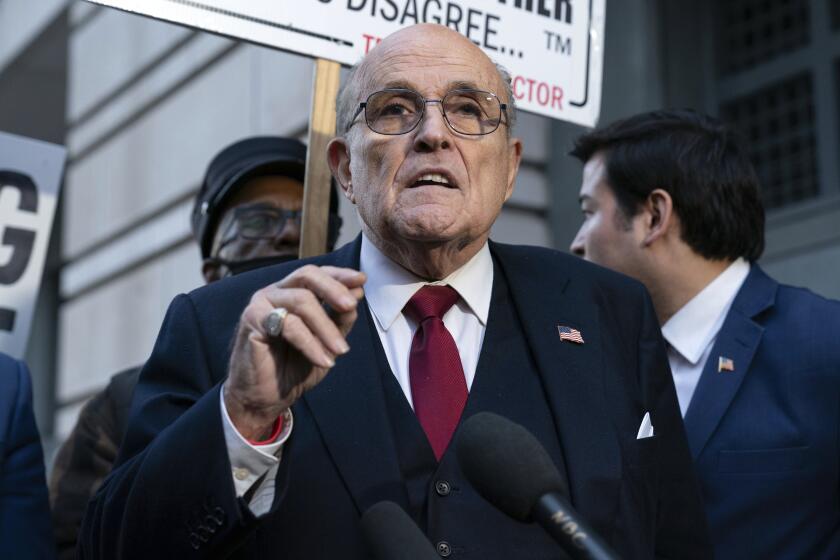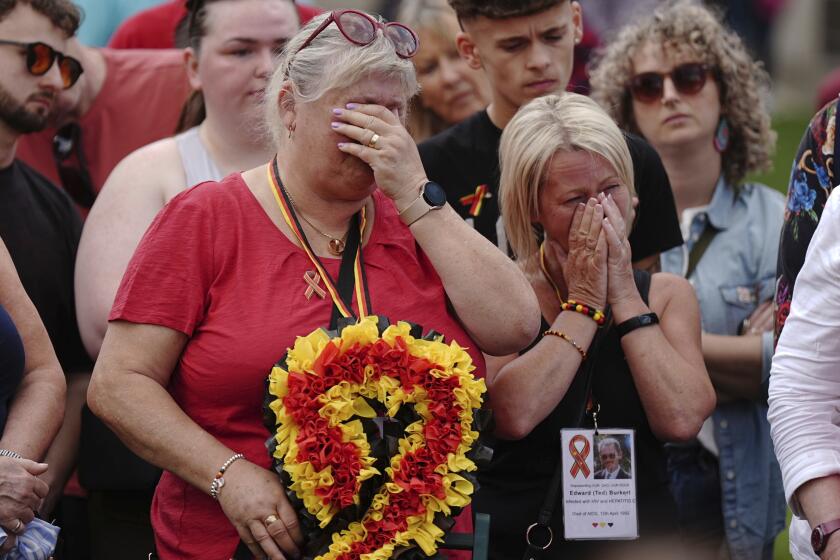Won’t Quit ‘in the Middle of a Storm,’ Noriega Says
Panama’s ruling strongman, Gen. Manuel A. Noriega, indicated Thursday that he has no intention of stepping down while the political conflict in his country continues, but he explained little about failed talks with the Reagan Administration to remove him from power.
“No commander abandons ship in the middle of a storm,” Noriega declared to legislators in a marathon question-and-answer session following a rambling, 90-minute speech.
In his haltingly delivered speech to Panama’s General Assembly, Noriega said only that the latest round of talks with Washington fell apart Wednesday because he rejected an ultimatum from a U.S. negotiator.
Never considered a strong orator, Noriega was at his most rhetorically unimpressive, and his address wandered from cliche to cliche. He lost his place in the speech three times and frequently wiped his brow.
At one point, he blamed his current troubles on the U.S. presidential campaign, which has made problems in Panama an early issue.
Noriega’s appearance was anxiously anticipated here in hopes that it would provide clarification of the evident stalemate between the general and the Administration.
For months, the White House has been trying to force Noriega from power and had sent a special envoy, Michael G. Kozak, to negotiate with him in an effort to gain the general’s retirement. In a controversial move, the Administration had offered to drop drug-trafficking charges pending in U.S. courts if Noriega stepped down.
On Wednesday, however, Secretary of State George P. Shultz said the talks had collapsed and called Kozak back to Washington from Panama City.
Little was made clear by Noriega on Thursday. He told the legislators that his representative, Romulo Escobar, a local politician, made several demands to Kozak: that the Reagan Administration end economic sanctions imposed on Panama; pull an unspecified number of troops from U.S. bases at the Panama Canal; recognize figurehead President Manuel Solis Palma as the country’s legal head of state; broaden talks to include other “sectors” of Panamanian society, and fix certain unspecified violations of treaties between the United States and Panama regarding the Panama Canal. All the points had been made public here before.
“There could not be an agreement if one point was left out,” Noriega said. Although he did not say which point had yet to be agreed to, he declared that Kozak presented him with an “ultimatum” to “accept the offer or it would be withdrawn.”
In any case, Noriega hinted that he was never bound by the talks, pointedly referring to them as “conversations, not negotiations.”
The speech also stumbled into numerous attacks on the United States. Noriega said that American presidential candidates, both Vice President George Bush for the Republicans and Massachusetts Gov. Michael S. Dukakis for the Democrats, should spend less time worrying about Panama and more time on problems in their own country.
At one point, moreover, Noriega seemed to hint that one of the candidates, whom he did not name, had something to hide and was trying to obscure the problem with attacks on Panama. There have been rumors in Panama that Noriega has some information that could be harmful to Bush’s candidacy.
Noriega also mentioned Assistant Secretary of State Elliott Abrams six times, accusing him of systematically telling lies about Panama.
“Before, the Americans tried to overthrow leaders by saying they were Communists. Today, it is because of drugs,” he said.
Occasionally, the general spoke in riddles, declaring: “We are not Irangates,” a reference to the Iran-Contra scandal.
Noriega, dressed in a formal khaki uniform adorned with medals and gold epaulets, was accompanied by his general staff and 20-member inner circle that is grouped into the newly formed Strategic Military Council. Noriega commands the Panama Defense Forces, the country’s 15,000-member military establishment.
The legislative hall was packed with his supporters, while opposition legislators boycotted the session.
As reasons for the collapse of the talks with the United States remain hazy, rumors are circulating in Panama that Noriega’s own staff refused to let him resign. At the same time, however, there are reports that Noriega’s underlings are unhappy with his continued rule.
Official statements from the defense forces insisted that reports of a virtual deal between Noriega and the U.S. envoy were false. A note published in the morning newspaper La Estrella said that at no point in the talks with Kozak was Noriega’s retirement under consideration.
At least one opposition leader seemed relieved that the talks had ended unsuccessfully. Ricardo Arias Calderon, president of the Christian Democratic Party, said Thursday that the United States was wrong to unilaterally negotiate with Noriega.
“I hope the United States has learned its lesson,” he said.
In Washington, Abrams sought support from Congress on Thursday for more forceful U.S. measures against Noriega, but he got little visible encouragement for either military intervention or covert action to push the general out of office.
Abrams told the Senate Foreign Relations Committee in a closed-door briefing that the failure of U.S. negotiations to push Noriega out of power demonstrated the need to go beyond the current economic sanctions to force the general to retire, officials said.
“There is growing support for doing more,” a senior State Department official said after the briefing. “It’s up to the Administration to define the options. But people are coming to the conclusion that we are going to have to push forward.”
Neither Abrams nor other officials have yet proposed specific actions that could be taken against Noriega, aides said. But Abrams has previously suggested such measures as covert operations to weaken Noriega’s hold on power, landing additional U.S. Marines to guard the Panama Canal, and placing deposed Panamanian President Eric A. Delvalle under the protection of U.S. troops, they said.
In Congress, where plans to drop the indictments against Noriega were roundly criticized, there was no clear consensus on what should be done now. Some called for more forceful measures, but others urged caution, and none called openly for military intervention. When reporters asked the chairman of the House Foreign Affairs Committee, Rep. Dante B. Fascell (D-Fla.), what the Administration should do next, he replied, “I don’t have the slightest idea.”
“Obviously the dust has to settle,” Fascell said. “If I were secretary of state, obviously I wouldn’t want anybody to do anything until I got back.” Secretary of State George P. Shultz and President Reagan are on their way to the U.S.-Soviet summit meeting in Moscow and will not return to Washington until late next week.
Sen. Christopher J. Dodd (D-Conn.) said he told Abrams that the Administration should not rule out any option, but added that U.S. military intervention is not warranted at this point. He said the internal opposition in Panama has been wrong to expect that the United States ultimately will solve the problem militarily.
“They should let things cool down for a while,” Dodd said.
Times staff writers Doyle McManus and Sara Fritz contributed to this story from Washington.
More to Read
Start your day right
Sign up for Essential California for news, features and recommendations from the L.A. Times and beyond in your inbox six days a week.
You may occasionally receive promotional content from the Los Angeles Times.






